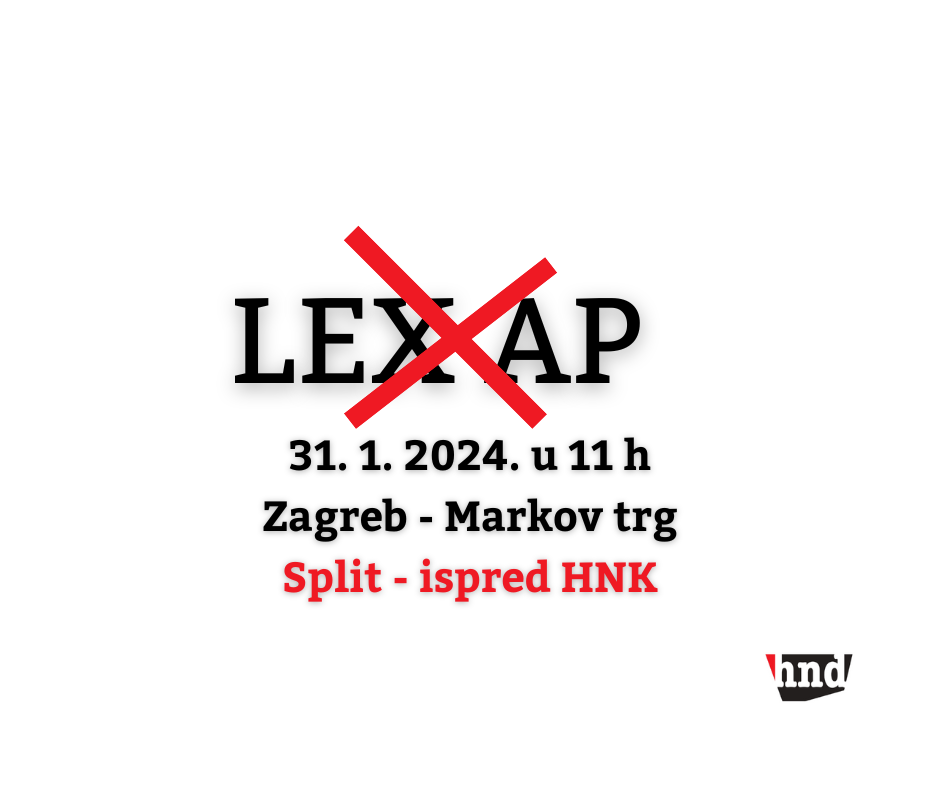
On Wednesday, January 31, 2024, journalists will take to the streets in Zagreb and Split to protest against amendments to the Criminal Code, in which the government of Andrej Plenković has introduced a new criminal offense called “Unauthorized disclosure of content from investigative or evidentiary actions.”
What changes in the Criminal Code?
The government has submitted Article 307.a for adoption to the Croatian Parliament, which reads:
“(1) A judicial official or public servant in a judicial body, a police officer or official, the accused, lawyer, legal trainee, witness, expert, translator, or interpreter who, during the preceding criminal procedure considered non-public according to the law, unlawfully discloses the content of investigative or evidentiary actions, with the intention of making it publicly accessible, shall be punished with imprisonment for up to 3 years.
(2) Committing, aiding, or abetting the offense under paragraph 1 of this Article cannot be attributed to those performing journalistic work.”
What does this mean?
This means that anyone who could potentially expose irregularities in investigations of criminal offenses, such as attempts to cover up corrupt actions by officials, will be penalized if they inform the public or journalists about it.
Journalists who publish such information will not be criminally liable, but it opens the door for the police or the State Attorney’s Office to search their phones, computers, emails, etc., to find the source of the information.
What are the consequences of these changes?
If such a law is enacted, citizens will be deprived of information for years about criminal proceedings of public interest, such as evidence that state officials, individuals in high political positions, ministers, for example, have committed corrupt criminal acts or abuse of power. This will prevent discussions on crucial issues for upcoming elections, and Croatia will become a declarative democracy.
The law opens wide doors to concealing abuses from the repressive apparatus and eliminates the public as a control mechanism for the work of the police, the State Attorney’s Office, and the courts. Individuals within the investigative system who come across information about irregularities of public interest will think twice before sharing it with the media. The state has intimidated them; three years of imprisonment is no joke.
If whistleblowers are silenced, citizens may never learn about certain criminal acts.
Remember the traffic accident involving the Vukovar-Srijem County Prefect Damir Dekanić a few years ago, where he crashed his official car while intoxicated and falsely claimed that his cousin was driving. If information from the investigation could not have been disclosed at that time, it is questionable whether he would have been arrested with three police officers under suspicion of assisting in the falsification of the accident.
If nothing could be revealed, the public might still be unaware that a police officer shot Mihael Berak and that it was not an unfortunate accident, as the police claim, but a deliberate murder with an official pistol, as the State Attorney’s Office believes.
The reasons for the failure of the expert examination in the “Agrokor” case, for which citizens paid 1,300,000 euros, would also remain unknown.
How did this proposal come about?
After the initials “AP” appeared in a correspondence during the investigation against former Minister Gabriela Žalac at the beginning of 2023, and the media reported it, the public suspected that these were the initials of the Prime Minister. After that, Prime Minister Andrej Plenković stated:
“We will change the Criminal Procedure Act and the Criminal Code, and situations like these, where things uncontrollably, intentionally, politically, selectively, and arranged leak out of the case and cause political problems, will no longer happen because it will be a criminal offense.”
Subsequently, the amendments to the Criminal Code were referred to as “Lex AP” in public.
The Croatian Journalists’ Association called it a “law of dangerous intentions” because it believes it is directly aimed at protecting abuses in politics, against public interest, and freedom of the media.
The Criminal Code and the Criminal Procedure Act are fundamental laws that grant state bodies strong repressive powers and are crucial for the rule of law in any country due to daily political events and the possible concealment of political corruption.
Join us on January 31, 2024, at 11 a.m. at St. Mark’s Square in Zagreb or in front of the Croatian National Theater in Split.
Croatian Journalists’ Association